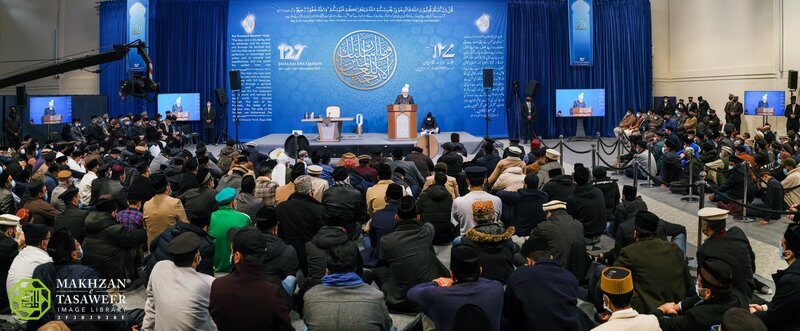
Islamabad, UK, 25 December 2022: At around 10:30 am GMT, Hazrat Mirza Masroor Ahmad, Khalifatul Masih V, may Allah be his Helper, arrived at the Masroor Hall, Islamabad, UK for the concluding session of Jalsa Salana Qadian 2022.
Hazrat Amirul Momineenaa had already announced during his Friday Sermon on 23 December 2022 that he would address the 127th Jalsa Salana Qadian on Sunday and that about seven to eight African countries were also holding their annual conventions simultaneously. He had said that they would also be made part of his address through Muslim Television Ahmadiyya International. Hence, not only was a live feed set up between Islamabad, UK and Qadian, India, but most of the aforementioned countries were also connected via video links, creating a truly global atmosphere. Moreover, Ahmadis across the world tuned in through MTA for Huzoor’saa concluding address.
After his arrival, Huzooraa invited Feroz Alam Sahib to recite a portion of the Holy Quran and to present its Urdu translation. He recited verses 285 to 287 of Surah al-Baqarah. Following this, Nasir Ali Usman Sahib was invited to present an Urdu poem composed by the Promised Messiahas in praise of Allah the Exalted.
Hazrat Khalifatul Masih Vaa then took to the podium to deliver the concluding address of Jalsa Salana Qadian 2022.
After reciting tashahud, ta‘awuz and Surah al-Fatihah, Hazrat Khalifatul Masihaa said, by the grace of Allah the Exalted, it was the last day of Jalsa Salana Qadian and that some African countries were also holding their jalsas simultaneously. Those included Nigeria, Ivory Coast, Guinea-Bissau, Guinee-Conakry, Togo, Burkina Faso, Mali and Zimbabwe. Huzooraa added that, by His grace, Allah the Almighty had, through the means of MTA, enabled us all to be interconnected, as many of those countries had been able to join in with us virtually. Allah had enabled us to see and listen to one another. Huzooraa added, “At the exact same time, all these countries are able to listen to my words, are able to see us and we are able to see them. This is also the fulfilment of the promise of Allah the Almighty to the Promised Messiahas.”
Huzooraa then narrated some of the history of Jalsa Salana, especially shedding light on the very first jalsas that took place during the life of the Promised Messiahas. Huzooraa stressed that the objective of those jalsas was to “progress in religious, spiritual and moral pursuits.” Huzooraa said, it was with these objectives in mind that the Ahmadiyya Muslim Community held its conventions across the world. Huzooraa said it was a sign of Allah’s help and support for the Promised Messiahas that the Jalsa Salana which started with humble beginnings had become an ever-progressing global phenomenon. Those who raised questions were blind to the truth, otherwise, this alone should be enough for them to prove how Allah the Almighty was supporting and blessing the mission of the Promised Messiahas.
Huzooraa then brought home the point and asked, “What are our duties after having witnessed these blessings? We have gathered together for the Jalsa Salana and people all around the world are listening to this Jalsa Salana. They are observing the scenes. However, in order to continue to partake of the blessings of Allah the Exalted, we will also have to fulfil our duties. We have made a promise and a pledge of bai‘at with the Promised Messiahas by joining the Ahmadiyya Muslim Community. We are duty-bound to fulfil that pledge. In order to do this, we will have to bring about pious changes in us.”
Drawing the attention of Ahmadis around the globe to some of the objectives of bai‘at — especially focusing on the second condition — Huzooraa said, “If we mould our lives according to this, we will witness a revolution taking place in our lives and in the world at large.”
“The second condition of the bai‘at is, ‘That he/she shall keep away from falsehood, fornication/adultery, trespasses of the eye, debauchery, dissipation, cruelty, dishonesty, mischief and rebellion; and that he/she will not permit himself/herself to be carried away by passions, however strong they might be.’ The Promised Messiahas has mentioned nine evils in this and has drawn our attention towards them. When one abandons and shuns these nine evils, one is able to progress in spirituality,” Huzooraa said.
Falsehood:
Regarding falsehood, Huzooraa quoted and explained the following verse of the Holy Quran:
فَاجۡتَنِبُوا الرِّجۡسَ مِنَ الۡاَوۡثَانِ وَاجۡتَنِبُوۡا قَوۡلَ الزُّوۡرِ
“Shun therefore the abomination of idols, and shun all words of untruth.” (Surah al-Hajj, Ch. 22:V.31)
Huzooraa said, the Promised Messiahas had explained that the uttering of falsehood was tantamount to shirk i.e. associating partners with God and that the Holy Quran had stressed truthfulness even if it was at the expense of testifying against one’s relatives. (Surah an-Nisa, Ch.4:V.136) This was the standard of truthfulness that every Ahmadi should try their utmost to adhere to. And we needed to undertake detailed self-analysis in this regard.
Huzooraa also quoted a hadith of the Holy Prophetsa in which he declared falsehood to be the greatest of all evils. Huzooraa admonished that we ought to keep the standard of the truthfulness of the Holy Propehtsa in mind, who would not lie even by way of jest and used to say, ‘Adopt truthfulness because truthfulness leads towards virtue, and virtue leads to Paradise. Avoid falsehood because falsehood leads to disobedience, and disobedience conveys one to Hell.’ The Holy Prophetsa had also said, ‘Whoever has the following characteristics, is a hypocrite: When he speaks, he tells a lie, when he makes a contract, he breaks it; and when he makes a promise, he breaks it.’
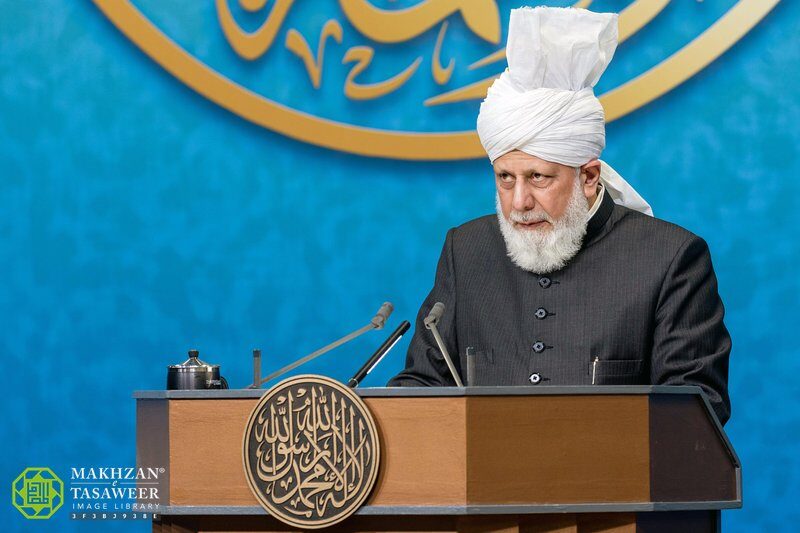
With reference to the sayings of the Promised Messiahas, Huzooraa further elaborated on the importance of shunning falsehood and adopting truth. The Promised Messiahaa had said, generally, people of the world said that one who told the truth, was caught or imprisoned. However, the reason truthful people suffered punishment, was not that they were honest, rather, it was because they had some other concealed vices in them. Allah knew each of our vices. Hence, Huzooraa said, we ought to always seek forgiveness (istighfar) from Allah the Almighty.
Huzooraa said, “In today’s society, we see people lying at every step. Seeing this, some may think that perhaps, saying something wrong to a minor extent occasionally may not be a sin and may hence not be harmful. However, it is such an attitude that actually leads to even greater falsehoods and one slowly loses the importance of telling the truth. Thus, every single Ahmadi must increase the level of truthfulness to the highest possible standards. If we achieved those standards, many of our disagreements would also vanish.”
Fornication or adultery:
Next, Huzooraa said, the Promised Messiahas had admonished us to keep away from adultery or fornication in this second condition of bai‘at.
“In today’s society, the media has promoted and spread adultery beyond all limits. Under such circumstances, we have to save ourselves as well as our children and we will have to make special efforts in doing so,” Huzooraa said.
Huzooraa then quoted the following verse of the Holy Quran:
وَلَا تَقۡرَبُوا الزِّنٰۤی اِنَّہٗ کَانَ فَاحِشَۃً ؕ وَسَآءَ سَبِیۡلًا
“And come not near unto adultery; surely, it is a foul thing and an evil way.” (Surah Bani Israil, Ch.17: V.33)
“What is the media doing today? They are now broadcasting children’s programmes that are poisoning their minds. Under such circumstances, it is something that we have to be really worried about. We have to exert immense efforts in this regard.” Huzooraa said.
Explaining that zina did not only entail the obvious act of adultery or fornication but also included all of the things that may ultimately lead one to this evil, including indecent movies or indecent thoughts. Moreover, Allah the Exalted had also stated:
اِنَّ الَّذِیۡنَ یُحِبُّوۡنَ اَنۡ تَشِیۡعَ الۡفَاحِشَۃُ فِی الَّذِیۡنَ اٰمَنُوۡا لَہُمۡ عَذَابٌ اَلِیۡمٌ ۙ فِی الدُّنۡیَا وَالۡاٰخِرَۃِ ؕ وَاللّٰہُ یَعۡلَمُ وَاَنۡتُمۡ لَا تَعۡلَمُوۡنَ
“Those who love that immorality should spread among the believers, will have a painful punishment in this world and the Hereafter. And Allah knows, and you know not.” (Surah an-Nur, Ch. 24: V. 20)
Huzooraa said, those who followed these filthy ways, often had to suffer all types of diseases. And in terms of the hereafter, only Allah knew the intensity and the extent of the punishment they would receive.
“So, where we have to purify the society from this evil, which is spiralling and rapidly spreading to unimaginable degrees, and where we have to save our children, our families and our relatives, there we will also have to try to admonish other people. In fact, the truth of the matter is that this is also an aspect or rather, the very agenda of those who are promoting atheism. This is one of the strategies that they are using to try and move people away from religion and God. So, we also have to carry out an immense self-struggle against this.”
With reference to the ahadith and the writings of the Promised Messiahas, Huzooraa further elaborated on this point and prayed, “May Allah, the Almighty give sense to the world and enable them to listen to our message. May we be able to spread the message and be saved from these evil ways.”
Trespasses of the eye:
The next evil, Huzooraa shed light on was the trespassing of the eyes and quoted the following verses in this regard:
قُلۡ لِّلۡمُؤۡمِنِیۡنَ یَغُضُّوۡا مِنۡ اَبۡصَارِہِمۡ وَیَحۡفَظُوۡا فُرُوۡجَہُمۡ ؕ ذٰلِکَ اَزۡکٰی لَہُمۡ ؕ اِنَّ اللّٰہَ خَبِیۡرٌۢ بِمَا یَصۡنَعُوۡنَ
وَقُلۡ لِّلۡمُؤۡمِنٰتِ یَغۡضُضۡنَ مِنۡ اَبۡصَارِہِنَّ وَیَحۡفَظۡنَ فُرُوۡجَہُنَّ وَلَا یُبۡدِیۡنَ زِیۡنَتَہُنَّ اِلَّا مَا ظَہَرَ مِنۡہَا وَلۡیَضۡرِبۡنَ بِخُمُرِہِنَّ عَلٰی جُیُوۡبِہِنَّ ۪ وَلَا یُبۡدِیۡنَ زِیۡنَتَہُنَّ اِلَّا لِبُعُوۡلَتِہِنَّ اَوۡ اٰبَآئِہِنَّ اَوۡ اٰبَآءِ بُعُوۡلَتِہِنَّ اَوۡ اَبۡنَآئِہِنَّ اَوۡ اَبۡنَآءِ بُعُوۡلَتِہِنَّ اَوۡ اِخۡوَانِہِنَّ اَوۡ بَنِیۡۤ اِخۡوَانِہِنَّ اَوۡ بَنِیۡۤ اَخَوٰتِہِنَّ اَوۡ نِسَآئِہِنَّ اَوۡ مَا مَلَکَتۡ اَیۡمَانُہُنَّ اَوِ التّٰبِعِیۡنَ غَیۡرِ اُولِی الۡاِرۡبَۃِ مِنَ الرِّجَالِ اَوِ الطِّفۡلِ الَّذِیۡنَ لَمۡ یَظۡہَرُوۡا عَلٰی عَوۡرٰتِ النِّسَآءِ ۪ وَلَا یَضۡرِبۡنَ بِاَرۡجُلِہِنَّ لِیُعۡلَمَ مَا یُخۡفِیۡنَ مِنۡ زِیۡنَتِہِنَّ ؕ وَتُوۡبُوۡۤا اِلَی اللّٰہِ جَمِیۡعًا اَیُّہَ الۡمُؤۡمِنُوۡنَ لَعَلَّکُمۡ تُفۡلِحُوۡنَ
“Say to the believing men that they restrain their eyes and guard their private parts. That is purer for them. Surely, Allah is well aware of what they do. And say to the believing women that they restrain their eyes and guard their private parts, and that they disclose not their [natural and artificial] beauty except that which is apparent thereof, and that they draw their head-coverings over their bosoms, and that they disclose not their beauty save to their husbands, or to their fathers, or the fathers of their husbands or their sons or the sons of their husbands or their brothers, or the sons of their brothers, or the sons of their sisters, or their women, or what their right hands possess, or such of male attendants as have no sexual appetite, or young children who have no knowledge of the hidden parts of women. And they strike not their feet so that what they hide of their ornaments may become known. And turn ye to Allah all together, O believers, that you may succeed.” (Surah an-Nur, Ch.24: V.31-32)
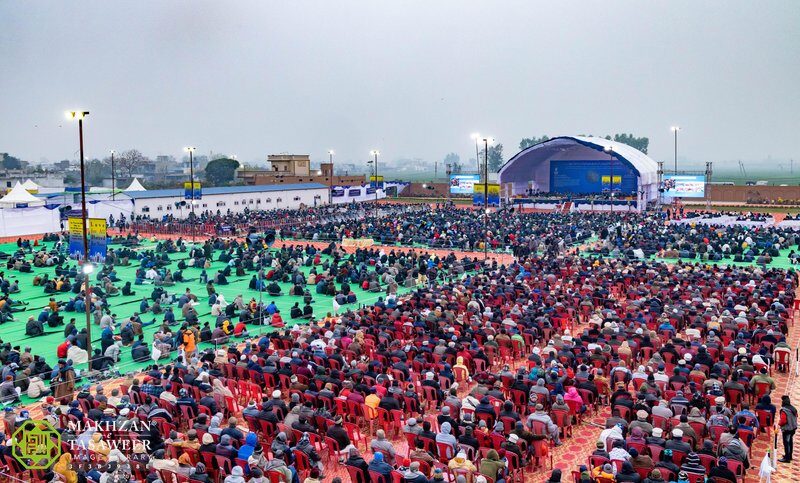
Huzooraa further explained the verse with writings of the Promised Messiahas and said, “Men and women, both have been instructed by Islam to cast their gaze down and the Holy Quran has established a lasting standard of chastity. It is only by following that standard, that we can establish a pure society.”
In this regard, Huzooraa presented a hadith of the Holy Prophetsa in which it is narrated that when a bind companion came to the Holy Prophetsa, he instructed his wives to observe purdah. Upon this, the ladies said, the companion was blind but the Holy Prophetsa replied, “Are you two blind too?” Huzooraa added, “This is the standard the Holy Prophetsa wanted to establish. This incident also provides a reply to such people — be it men or women — who say, or some Ahmadi also raise this question, that the Jamaat was too strict with regards to purdah.”
Debauchery and dissipation:
The next evil mentioned in the second condition of bai‘at, Huzooraa said, was debauchery and dissipation, about which Allah stated:
اِنَّا مُنۡزِلُوۡنَ عَلٰۤی اَہۡلِ ہٰذِہِ الۡقَرۡیَۃِ رِجۡزًا مِّنَ السَّمَآءِ بِمَا کَانُوۡا یَفۡسُقُوۡنَ
“‘We are surely going to bring down on the people of this town a punishment from heaven, for they have been rebellious.’” (Surah al-‘Ankabut, Ch. 29: V. 35)
Huzooraa said, “This is something we should be deeply concerned about. We should always do istighfar i.e., seek forgiveness for our sins and try to stay in the refuge of Allah. This kind of fisq has been spread everywhere in the world these days.” Huzooraa then quoted the following verse of the Holy Quran:
وَیَوۡمَ یُعۡرَضُ الَّذِیۡنَ کَفَرُوۡا عَلَی النَّارِ ؕ اَذۡہَبۡتُمۡ طَیِّبٰتِکُمۡ فِیۡ حَیَاتِکُمُ الدُّنۡیَا وَاسۡتَمۡتَعۡتُمۡ بِہَا ۚ فَالۡیَوۡمَ تُجۡزَوۡنَ عَذَابَ الۡہُوۡنِ بِمَا کُنۡتُمۡ تَسۡتَکۡبِرُوۡنَ فِی الۡاَرۡضِ بِغَیۡرِ الۡحَقِّ وَبِمَا کُنۡتُمۡ تَفۡسُقُوۡنَ
“And on the day when those who disbelieve will be brought before the Fire, [it will be said to them], ‘You exhausted your good things in the life of the world, and you [fully] enjoyed them. Now this day you shall be requited with ignominious punishment because you were arrogant in the earth without justification, and because you acted rebelliously.’” (Surah al-Ahqaf, Ch.46:V.21)
With regards to parenting, Huzooraa said, the Promised Messiahas had admonished, if a person expressed his desire to have righteous children, it would be considered a half-hearted and hollow desire until that person first brought upon a righteous change in himself. If he was engaged in debauchery and dissipation and expressed wishes to have pious children, he would be a great liar.
Cruelty:
Huzooraa went on to shed light on the evil of cruelty that we have pledged to keep away from and quoted the following verse of the Holy Quran in this regard:
فَوَیۡلٌ لِّلَّذِیۡنَ ظَلَمُوۡا مِنۡ عَذَابِ یَوۡمٍ اَلِیۡمٍ
“So woe to the wrongdoers because of the punishment of a grievous day.” (Surah az-Zukhruf, Ch. 43: V. 66)
Moreover, Huzooraa said, the Holy Prophetsa had declared in some ahadith that poverty in the eyes of people meant a lack of wealth but those of his ummah would be considered true paupers on the Day of Judgement, who, although had observed salat and fasting etc. but had also committed cruelty against people, because their good deeds would be transferred to those against whom they had committed any cruelty.
In this regard, Huzooraa also presented the following quote from the writings of the Promised Messiahas:
“Show mercy to His servants and do not wrong them by your tongue or your hand or by any other means, and strive for the welfare of God’s creation. Behave not arrogantly towards anyone even if he is your subordinate, and revile not anyone even if he should revile you. Become humble, tolerant, well-intentioned and compassionate towards God’s creation so that you may be accepted by God.
“There are many who show meekness, but they are wolves from within. There are many who outwardly appear clean, but from within they are serpents. You, therefore, cannot be accepted by God unless you are the same inside and out. If you are above others, have mercy on the lowly and do not look down upon them. If you are learned, counsel the ignorant and do not degrade them with disdain. If you are wealthy, serve the poor, and do not treat them with arrogance and self-conceit. […]
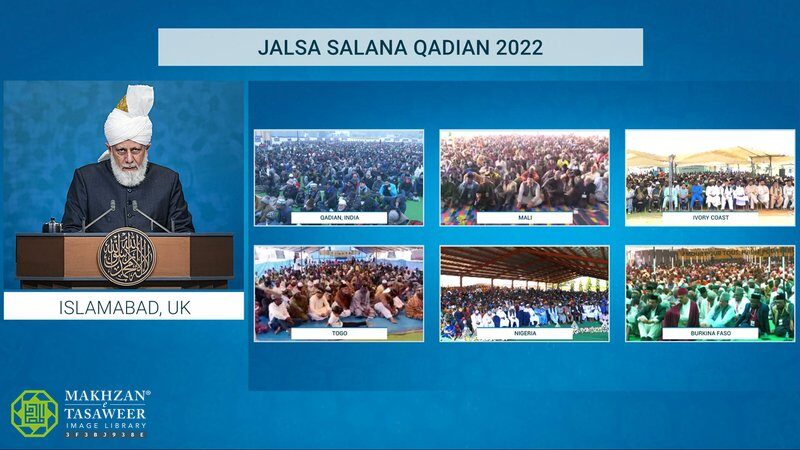
“Part with your ego in every way and do away with mutual grievances. Be humble like the guilty, though truth be on your side, so that you may be forgiven. Do not feed your vanity, for those who are bloated cannot enter the gate to which you have been called.
“How unfortunate is the one who does not believe in that which has come from the mouth of God and which I have set forth. If you desire that God should be pleased with you in heaven, unite with one another as though you were brothers from the same womb. The one who most forgives the transgressions of his brother is the more honourable among you. Unfortunate is the one who is obstinate and does not forgive. Such a person has no part in me. Be very fearful of God’s curse, for He is Holy and Jealous. An evildoer cannot attain nearness to God. One who is arrogant cannot attain nearness to God. A wrongdoer cannot attain nearness to God. He who is unfaithful cannot attain nearness to God. […]
“Have mercy on your subordinates and your wives and your less fortunate brethren so that you too may be shown mercy in heaven.”
Dishonesty:
Next, Huzooraa spoke on dishonesty and quoted the following verse of the Holy Quran in this regard:
وَلَا تُجَادِلۡ عَنِ الَّذِیۡنَ یَخۡتَانُوۡنَ اَنۡفُسَہُمۡ ؕ اِنَّ اللّٰہَ لَا یُحِبُّ مَنۡ کَانَ خَوَّانًا اَثِیۡمًا
“And plead not on behalf of those who are dishonest to themselves. Surely, Allah loves not one who is perfidious [and] a great sinner.” (Surah an-Nisa, Ch. 4: V. 108)
“Here, we also need to assess whether we are doing justice to fulfilling the rights that we owe with regards to our bai‘at. Or are we being guilty of any kind of perfidiousness in this regard,” Huzooraa said. The Holy Prophetsa used to seek God’s protection from these things, Huzooraa said.
Huzooraa then presented various pieces of admonition from the sayings and writings of the Promised Messiahas in this regard, including the following:
“Whosoever does not repent of every vice and every evil deed, such as drunkenness, gambling, lustful glances, deceit, bribery and every misappropriation, is not of my community. […] Every husband who deceives his wife, and every wife who deceives her husband, is not of my community.”
With regards to dishonesty in financial dealings and non-repayment of debts, Huzooraa said that Islam condemned this in the strongest of terms, so much so that the Holy Prophetsa did not use to offer the funeral prayer of a person who was guilty of such vices.
Mischief:
Then, Huzooraa spoke on mischief and presented the following verse in this regard:
وَابۡتَغِ فِیۡمَاۤ اٰتٰٮکَ اللّٰہُ الدَّارَ الۡاٰخِرَۃَ وَلَا تَنۡسَ نَصِیۡبَکَ مِنَ الدُّنۡیَا وَاَحۡسِنۡ کَمَاۤ اَحۡسَنَ اللّٰہُ اِلَیۡکَ وَلَا تَبۡغِ الۡفَسَادَ فِی الۡاَرۡضِ ؕ اِنَّ اللّٰہَ لَا یُحِبُّ الۡمُفۡسِدِیۡنَ
“‘And seek, in that which Allah has given thee, the Home of the Hereafter; and neglect not thy lot in this world; and do good [to others] as Allah has done good to thee; and seek not to make mischief in the earth, verily Allah loves not those who make mischief.’” (Surah al-Qasas, Ch.28:V.78)
Huzooraa elaborated on this point with a hadith and said, Muslims of today were making themselves guilty of mischief [fasad] by engaging in the killing of fellow Muslims. Huzooraa prayed, “May Allah have mercy on the Muslim ummah and allow us to fulfil our duty of conveying the message of the Promised Messiahas to them. May Allah enable them [the non-Ahmadis] to accept him.”
Rebellion:
Finally, Huzooraa spoke on rebellion and presented the following verse in this regard:
یٰۤاَیُّہَا الَّذِیۡنَ اٰمَنُوۡۤا اَطِیۡعُوا اللّٰہَ وَاَطِیۡعُوا الرَّسُوۡلَ وَاُولِی الۡاَمۡرِ مِنۡکُمۡ ۚ فَاِنۡ تَنَازَعۡتُمۡ فِیۡ شَیۡءٍ فَرُدُّوۡہُ اِلَی اللّٰہِ وَالرَّسُوۡلِ اِنۡ کُنۡتُمۡ تُؤۡمِنُوۡنَ بِاللّٰہِ وَالۡیَوۡمِ الۡاٰخِرِ ؕ ذٰلِکَ خَیۡرٌ وَّاَحۡسَنُ تَاۡوِیۡلًا
“O ye who believe! obey Allah, and obey [His] Messenger and those who are in authority among you. And if you differ in anything among yourselves, refer it to Allah and [His] Messenger if you are believers in Allah and the Last Day. That is best and most commendable in the end.” (Surah an-Nisa, Ch.4:V.60)
“This means that you should judge, pass verdicts and make decisions according to the teaching of God and His Messengersa. That teaching was that one should inform the ruling government of their mistake. However, if they do not accept it, then leave the matter with Allah the Exalted. Then, Allah will deal with them as He Himself desires. However, one should also continue to pray for them that Allah the Exalted may enable them to act upon justice,” Huzooraa said.
In view of the sayings of the Holy Prophetsa and the Promised Messiahas, Huzooraa further stressed the importance of maintaining peace in the land and not spreading any kind of discord. Huzooraa also elaborated on the significance of controlling anger in view of Islamic teachings.
“This is our way of life and code of conduct. If we act upon this, then, as I said earlier, we would be able to bring about a great revolution. Every condition of bai‘at is based on immense wisdom. An Ahmadi should continue to ponder over them in order to strengthen and refine their faith. Only then will we be able to do justice to the requirements of bai‘at,” Huzoor said.
Centenary of Lajna Imaillah:
With regard to the centenary of Lajna Imaillah, Hazrat Khalifatul Masih Vaa said, “Today, a hundred years have passed since the establishment of Lajna Imaillah as an auxiliary organisation of the Community. Lajna [members] should remember to undertake an analysis of the past hundred years to see as to what extent they have brought about a pious transformation within themselves, done justice to the pledge of bai‘at, made efforts in this regard, and to what extent they helped their children and progeny to understand, become attached to and accept the claims of the Promised Messiahas and do justice to their bai‘at. If they have brought their children up in this manner, then certainly, the members of Lajna Imaillah are grateful servants of Allah the Exalted. Thus, it is necessary to make these assessments today. Then, if any shortcomings are identified, you should make a firm resolve that, ‘We shall enter the next century of Lajna Imaillah with this resolution that we shall mould our offspring to become such that they do justice to their pledge of bai‘at.’ May Allah enable all to do so.”
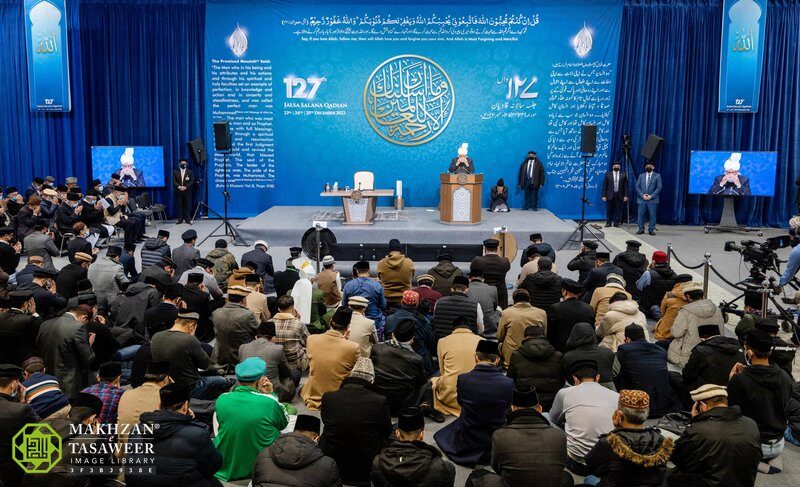
In the end, Huzooraa announced that about 14,500 attendees were present in the Jalsa gah of Qadian, India and 37 countries were represented there. Huzooraa prayed for all the attendees of Jalsa Salana Qadian, and those of other jalsas around the world, before leading everyone in silent prayer. Hazrat Amirul Momineenaa then permitted taranay (choral poems) to be recited.
Huzooraa then conveyed his salaam and Jalsa Salana Qadian 2022 came to a successful end.
(Report prepared by Al Hakam)

